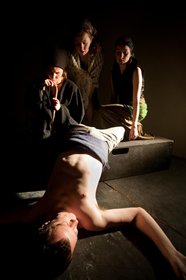Nervousystem make all the right noises. They talk a lot about the need to experiment. They refreshingly extrapolate on the laboratorial constituents of drama and the need for performance research as well as the desire to explore their own ongoing interrogation of the theatre space alongside and connected to sometimes traditional texts and forms. Hence, Weaving the Cry, a re-enactment of J.M. Synge’s short dramatic piece Riders to the Sea. Synge’s tale tells the story of a mother and her two daughters on an island off the West of Ireland, and how they cope with the imminent and inevitable loss of the last son and brother. Nervousytem keep the essentials of that drama but they add as a palimpsest to the originary text a Galician touch through the mother figure, Maurya (Marian Araujo), who sings a hypnotic, melancholic traditional Galician song.
Nervousystem make great use of the relatively new space that is The Back Loft. Entering the actual performance space is something of a journey in itself as groups of the audience are chaperoned with care into their seats. Weaving the Cry is played in the round. This strategy allows us to see in a more individuated way how the three women individually tackle and contend with their circumstances; playing it in the round also reinforces the limits the lives of the characters we watch, since our own perspective as we watch is limited.
 The story itself is still that of Synge’s: the struggle of a mother who knows she has to let her son go be a man even if this risks the possibility that he will not come back alive one day. Nervousystem want us to see the mother not merely as a victim but as the master of ceremonies in this re-enactment of her tragedy. As such, Marian Araujo pounds her staff/walking stick as if conducting the movements in her tragedy. Her daughters, Cathleen (Sophie Campbell) and Nora (Gemma McGill), equally jump to and rebel from their mother’s harsh, dark tune.
The story itself is still that of Synge’s: the struggle of a mother who knows she has to let her son go be a man even if this risks the possibility that he will not come back alive one day. Nervousystem want us to see the mother not merely as a victim but as the master of ceremonies in this re-enactment of her tragedy. As such, Marian Araujo pounds her staff/walking stick as if conducting the movements in her tragedy. Her daughters, Cathleen (Sophie Campbell) and Nora (Gemma McGill), equally jump to and rebel from their mother’s harsh, dark tune.
The space has few props: a rocking chair, a ladder, a suitcase, a walking stick, some buckets and fishing nets strewn about. As in son Bartley’s death, when Maurya takes Bartley’s scarf out of his suitcase and positions it beside him to represent his spilled blood from his fall onto the rocks, whatever else the set requires is manufactured through collective imagination and constructed by the actors themselves. This is illustrated most impressively when the three women concoct a net with twine that covers the entire set and acts also as the inescapable metaphorical net they are all caught up in. This ‘weaving’ is the prelude to the inevitable death of Bartley (Joseph Moylan).
In an attempt to get into the underbelly of Synge’s tale, we see Nora grappling with her stifled sexuality while Bartley wrestles with his manhood, Catherine with her need for independence, and Maurya is in deep conflict with a maternal instinct that appears cruel and mocking in her circumstances. Somehow, though, Nervousystem’s desire that all of this should feel urgent and contemporary is left floundering on the rocks of its own introspection. We get snapshots of why all this pain and death matters but more intensity was needed to make you feel this was more than just exploration of craft and method.
Patrick Brennan was chief theatre critic and arts writer with the Irish Examiner from 1990-2004. He is currently writing a book on the theatre of Tom Murphy.